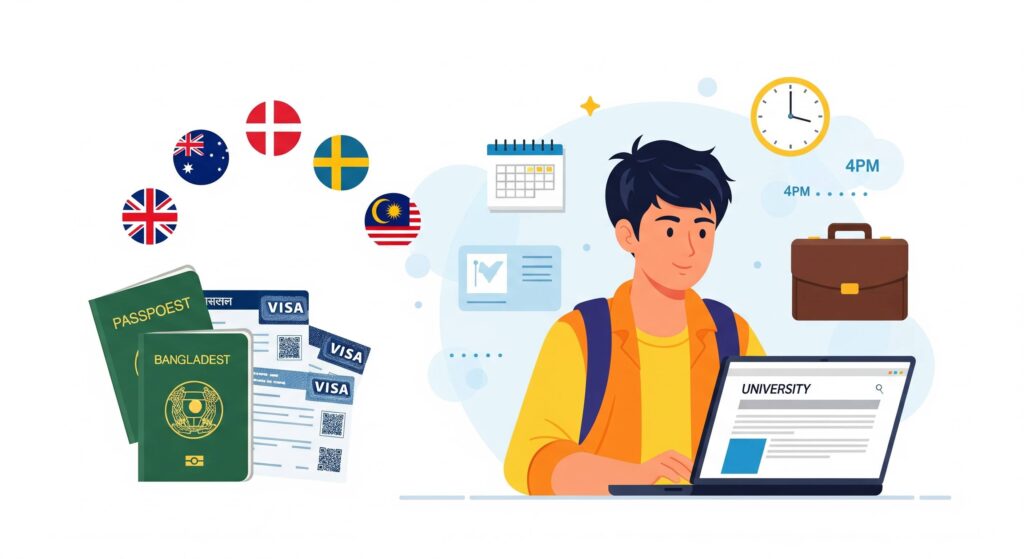Can I Work While Studying Abroad?

Yes, in the most popular study destinations you can, but the rules are different in every country.
For Bangladeshi students, this is one of the most common questions when planning to study in the UK, Australia, Denmark, Sweden, or Malaysia. Part-time work can make a huge difference it helps pay rent, cover groceries, and ease the financial load on your family. However, it’s crucial to understand the number of hours you can work, the types of jobs permitted, and the conditions under which you can work full-time, to avoid violating visa rules.
For example, the UK allows up to 20 hours per week during term time, while Australia permits 48 hours per fortnight. Sweden has no strict hourly limit, but balancing studies is essential. Denmark recently tightened work rights for non-state-approved programs, and Malaysia only allows work during semester breaks.
This guide breaks down all five countries, compares their work rights, and gives you smart tips to make the most of your time abroad legally and successfully.
UK Student Visa Work Rights
Work Hours & Rules
- Term Time: Up to 20 hours per week if you are studying at a licensed university on a Student visa.
- During Breaks: Full-time work is allowed.
- Not Allowed: Self-employment, freelance gigs, or running your own business.
- Post-Study: Eligible students can apply for the Graduate Route to stay and work in the UK for 2–3 years.
Australia: Flexible but Structured
Part-Time Work
- Working Hours: Students can work up to 48 hours per fortnight during study periods (about 24 hours per week).
- During Breaks: Unlimited work hours are allowed during official semester breaks.
- Visa Condition: Work rights are attached to your Subclass 500 Student Visa, and you must remain enrolled and meet attendance requirements.
Denmark 2025 Policy Changes
Important Updates
- From May 2025, non-EU/EEA students in non-state-approved programs no longer have work rights, post-study job search stays, or family reunification options.
- Students in state-approved programs still retain the right to work part-time and stay after graduation.
Tip: Always confirm that your program is state-approved before applying; otherwise, your ability to work will be restricted.
Sweden: Most Flexible Option
Work Opportunities
- Sweden does not impose a fixed weekly work-hour limit for international students with a valid study residence permit.
- Realistically, students usually work 10–20 hours/week to balance academics.
- After graduation, you can apply to stay for 12 months to search for work and apply for a work permit.
Malaysia Limited Work Rights
When & Where You Can Work
- When: Only during semester breaks or holidays longer than 7 days.
- Hours: Maximum of 20 hours per week.
- Sectors Allowed: Restaurants, petrol stations, mini-markets, and hotels.
- Approval: You need permission from your university and Malaysia’s immigration department.
Work While Studying Comparison Table
|
Country |
Allowed to Work? |
Max Hours (During Term) |
Full-Time During Breaks? |
Key Notes |
| UK |
Yes |
20 hours/week |
Yes |
Must have a Student visa; no self-employment or freelance work |
| Australia |
Yes |
48 hours per fortnight (~24 hrs/week) |
Yes |
Must maintain enrolment & attendance; unlimited work during breaks |
| Denmark |
Yes (if state-approved program) |
Typically 20 hrs/week |
Yes (with conditions) | Students in non-approved programs lose work rights from May 2025 |
|
Sweden |
Yes |
No fixed limit (balance recommended) |
Yes |
Valid residence permit required; language skills often needed |
| Malaysia |
Yes (with approval) |
Only during semester breaks |
Yes |
Job sectors are restricted; institutional and immigration approval are needed. |
Benefits of Working While Studying
- Financial Support: Covers part of living costs.
- Work Experience: Adds global experience to your CV.
- Language Skills: Improves communication and confidence.
- Networking: Meet new people, build professional contacts.
Risks & Smart Tips
Risks to Avoid
- Working more hours than your visa allows → could lead to visa cancellation.
- Accepting off-the-books or cash jobs without approval → risky for immigration compliance.
- Overworking → may hurt academic performance.
Tips for Success
- Know Your Limits: Track hours carefully.
- Pick Flexible Jobs: On-campus or near your university.
- Plan Ahead: Apply early, especially for on-campus jobs.
- Balance Study & Work: Your primary goal is education.
So, can you work while studying abroad? Absolutely but each country has its own rules.
- UK & Australia: Clear hour limits, with full-time allowed during breaks.
- Denmark: Great option if your course is state-approved.
- Sweden: Most flexible, but self-management is key.
- Malaysia: Work is allowed only during breaks and in specific sectors.
Plan, follow visa conditions, and choose a country that fits both your study goals and work needs. That way, you can support yourself financially, gain experience, and stay compliant with immigration laws.
Take the Next Step with UniEducation
Choosing where to study and where you can work is a big decision. Our UniEducation counsellors can guide you through:
- Picking the correct country (UK, Australia, Denmark, Sweden, or Malaysia)
- Preparing error-free visa applications
- Explaining work rights & building a realistic study-work plan
- Supporting you until you settle abroad
Start now! FREE Registration Form, leave your phone number and address,and our team will call you back to create your personalised plan.
